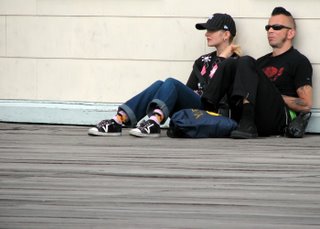 Jennifer Doyle, president of the Presentation School Foundation speaks at the Oak Square announcement celebration Oct. as Boston mayor Thomas M. Menino and Cardinal Seán P. O’Malley look on. Pilot photo/ Gregory L. Tracy
Jennifer Doyle, president of the Presentation School Foundation speaks at the Oak Square announcement celebration Oct. as Boston mayor Thomas M. Menino and Cardinal Seán P. O’Malley look on. Pilot photo/ Gregory L. TracyIt's wonderful when archdiocesan officials stop acting like petulant buttheads and start dealing with the laity on equal terms. Dropping the asking price from $2 million to $1 million allowed a citizen's group to use a parochial school building to help children. What a concept! But until Cardinal Sean acted, it was business as usual on Lake Street.
Closed Brighton school to be sold to community group
By Christine Williams
BRIGHTON — In Oak Square the DJ played U2’s “Beautiful Day,” children threw confetti and Allston-Brighton residents cheered the Oct. 19 announcement of the Archdiocese of Boston’s sale of a former school to the Presentation School Foundation (PSF).
The foundation plans to convert the former Our Lady of Presentation School, which closed in June 2005, to a community center. The archdiocese sold the building for $1 million — half the price offered by the PSF.
“It’s about our community. It’s about each one of you. For the past two years you have been here with us in the freezing cold, the sweltering heat and in the pouring rain,” said Jennifer Doyle, president of PSF. “Today there is sun.”
In planning the center, the PSF is working with the Oak Square YMCA and the Boston Public Library. The center will provide affordable pre-school, after-school programs and summer camps for local youth, educational enrichment programs in science, math, reading and writing for children as well as adult educational programs, including English as a second language and civics for immigrants.
As part of the agreement with the archdiocese, the building may not be used as an elementary school.
“This is a moment of common purpose and a moment of commitment to this community,” said Kevin M. Carragee, chair of the PSF. “I welcome Cardinal Seán O’Malley today and I highlight his role in crafting an agreement that serves this community, the city of Boston and this archdiocese.”
Cardinal O’Malley in turn thanked Boston Mayor Thomas M. Menino for supporting the initiative. Hard work and cooperation between those who worked on the agreement led to the mutually beneficial solution, he said.
“We all benefit from strong neighborhoods and communities where people can work, learn, play and grow together,” he added.
Cardinal O’Malley also acknowledged the conflict surrounding the closure of Our Lady of Presentation School.
The archdiocese was heavily criticized for abruptly closing the school June 8, 2005, two days before the last scheduled day of classes, to avoid a rumored occupation of the building.
The early closure prevented students from participating in planned graduation ceremonies and spurred protests by parents and community members on Oak Square Common. Parents maintained that while rallies had been scheduled, no sit-in had been planned.
At the time Menino said he was “outraged” by the decision to cancel the graduations and provided Faneuil Hall as an alternate site for the ceremony.
The cardinal addressed both former students and parents directly, saying, “We regret the events of the past. It is our hope and prayer that we can work together to enrich and enliven the Allston-Brighton community for many generations to come. Please know that the Church always welcomes you and values your presence.”
“The past two years have been a challenging time for the Presentation School Foundation, for the Allston-Brighton community and for the archdiocese,” he added. “In addition to the events surrounding the school closings, the clergy abuse crisis has left deep wounds in the Brighton community and we pray that this important accomplishment contributes to the foundation of trust necessary to enable the healing work for survivors, for families and for parishes.”
Menino also praised the community and the cardinal for their collaborative effort.
“When we all work together, we will achieve our goals,” he said. “This is one of the best days I could have as an elected official.”

